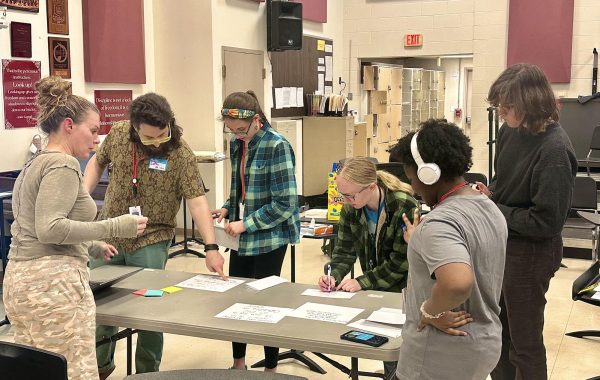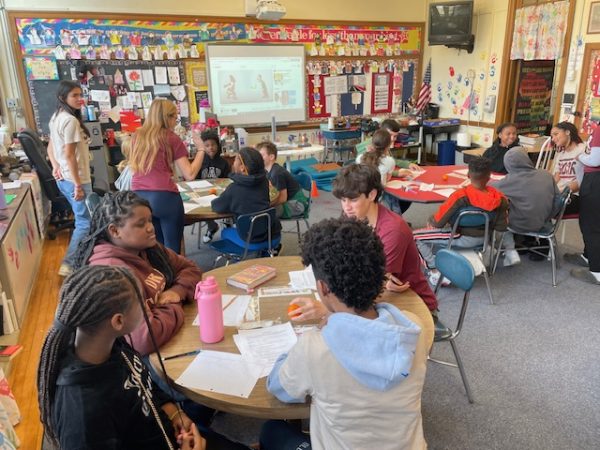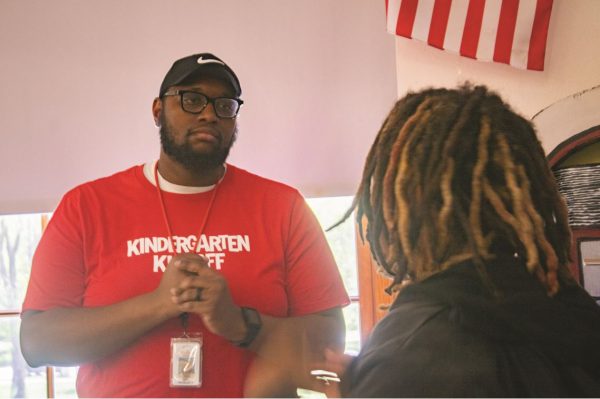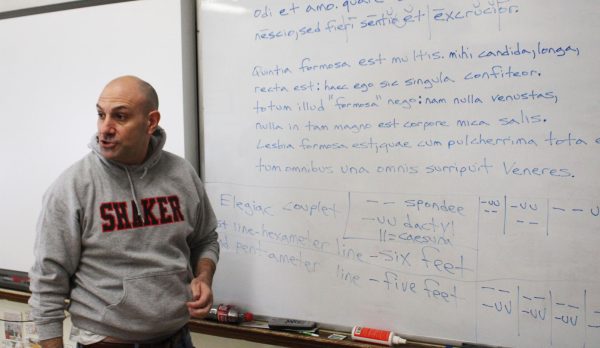New Policy Mandates Security Guards Stand All Day
Chairs removed following alleged rape at high school
For the Royal Guard who protect England’s monarchy, standing for two hours per shift is standard.
For Shaker Heights High School security guards, standing all day with two 15-minute breaks and a 30-minute lunch is the new normal. That adds up to almost eight hours on their feet per day.
For the past 10 to 15 years, security guards were provided chairs, said one guard. According to one security guard, because of “an unfortunate incident” at the high school, alluding to the alleged rape of a 15-year-old student Sept. 10 somewhere in the high school, the administration implemented the new standing and patrolling the halls policy.
Superintendent Gregory C. Hutchings said the policy change “was not completely driven by the incident, but it was one of the factors.” Before Hutchings became superintendent last summer, he toured the schools extensively. He said he was already forming ideas for security improvements as a result of those visits. These thoughts “triggered the conversation before the incident,” Hutchings said. “Safety officers sitting in the hallways was a concern because who’s watching the side hallways?”
Hutchings told a story of one visit during which he saw a book wedged between the door and its frame in the egress, presumably left there for some student to easily re-enter the building. This was a common occurrence, according to Hutchings.
“Someone said it was typical . . . [so] that was a major concern, to just be able to walk down the street and into the building . . . What if I wasn’t a nice person?” Hutchings said.
These concerns were addressed by policy changes in the aftermath of the alleged rape. The cover story of the Oct. 29 Shakerite detailed the district’s expedited security review. In the article, Principal Michael Griffith said he was in the process of altering security guard “patterns of movement and where we want people to roam. We might have had certain people that were stationary, in a spot. So we looked at certain things like, ‘Well, do we want to adjust things where somebody roams more and have fewer stationary spots, so their visibility is greater?’ ”
Griffith also said he was considering implementing technology that would track the movement of security guards. Other changes in consideration were new restrictions on entrance and exit door access, and the locking of interior doors to keep students out of unsupervised locations.
With respect to these more stringent policies, “security guards are expected to continue checking the building thoroughly . . . whenever they are on duty,” Director of Communications Peggy Caldwell wrote in an email message.
However, some security staff have perceived the move away from sitting as punitive. One guard said stationary security guards were not to blame for the alleged rape. “The fault doesn’t lie with the security guards. The fault lies with the home,” the guard said.
Asked why security staff have used chairs in the past, Caldwell explained that “standing and walking were always a part of the job, but there was a slippage over the years.”
Shaker’s new policy isn’t unique. Hutchings explained that in his previous school district, Alexandria City Public Schools, all doors are locked and security guards are required to rove the building during their shifts. Visitors to the building must be buzzed in at the front door and then scan their driver’s licenses or IDs into a computer, to “make sure no criminals were entering,” Hutchings said. “We didn’t have metal detectors because I don’t want it to be like a prison.”
Other local schools aren’t as vigilant. Beachwood City Schools do not employ security guards at Beachwood High School, where about 500 students attend, according to Assistant Principal Ryan Patti. The Lakewood City Schools, which are more comparable in size to Shaker, have eight private security personnel at their high school, according to Lakewood’s Communications and PR Specialist Christine Gordillo. Sometimes one guard will be shifted to another school if needed. Lakewood’s guards have only one 15-minute break and a 30-minute lunch during an eight-hour shift and remain on their feet otherwise.
The no-sitting policy has begun to take a toll on Shaker’s security staff. “Everyone has been [complaining] about . . . difficulties with legs, backs and feet,” a guard said. Some guards cited previous health problems that have made the transition to standing difficult.
“[Security guards] would be more productive if we could just sit down and take the stress off our bones,” a guard said. Many of the guards also work extra shifts. Although voluntary, these shifts “can range from a couple of hours to a full eight,” Caldwell wrote. “No one is assigned to consecutive 8-hour shifts.” If guards take an extra shift to work during an athletic event, play, or other activity, they may be required to stand.
While it may be demanding, the administration believes that the policy creates “greater visibility and better coverage,” Caldwell wrote. District Security Supervisor and retired Shaker police officer Michael Gale agrees. “Security personnel, police officers, etc., are hired to present to the public that they are at a location for the public’s protection, and their body language, dress, says a lot about the security person. If he/she looks sharp and displays good posture, it gives the public the idea that the security person knows what he is doing and that he is aware of what is going on. They need to be seen,” Gale wrote in an email response to questions.
Hutchings said he has received a lot of positive feedback about security moves, including guards moving through the halls. “I can’t say I’ve heard any concerns about the change,” he said. He mentioned some who are concerned about the open campus policy, but reiterated that he “doesn’t want to punish everybody” by changing it. He did mention implementing “better guidelines [of] how it operates and more accountability.”
In the October Shakerite story, Hutchings said he was leaning toward having “locations where they [juniors and seniors with free periods] exit. We’re working on exactly what the accountability system will be, but we want to have a way to kind of document who leaves the building, just to keep on record so that if there ever is an emergency, we would know who’s not in the building, what time they left the building, and that type of thing.”
While open campus policy isn’t changing at the moment, changes in security policy reach beyond the high school. “At the middle school, there are three monitors who move constantly through the building, with the exception of morning and dismissal time, when one is assigned to the door. At Woodbury, there is a staffed security desk where visitors are required to check in,” Caldwell wrote.
The new policy caused another security guard to wonder if the administration is unfairly questioning the guards’ commitment to their jobs. “If you’re crying, I’ll pull you aside and ask why — going above and beyond,” the guard said.
Referring to the district’s response to September’s alleged rape, one guard said, “They make it seem like it’s our fault, but it’s not. We’re very dedicated and committed to our jobs.”
While the job has always required dedication, “it hurts me that they are questioning our commitment [now],” a guard said. “I love the kids here, but it’s making me question the job.”
However, Hutchings sees the policy change as a solution, not an implication of anyone at fault for the September incident. “We’re not blaming anybody for that incident, and we want to make sure we have a safe environment for all students,” he said. The administration wants the security staff to continue to “build relationships and rapport and monitor what’s happening in the hallways.”
Guards also wonder if the new measures make a difference. “I can see both sides,” one guard said. “But I don’t see quite how it makes a difference having us stand all day—it does make the job more tedious, though.”
Hutchings believes this policy will solve a number of issues, but that “there is not a guarantee nothing will ever happen in our schools. I think that being proactive in our safety measures will provide a safer environment for our students where at least we’re monitoring where our students are so we can prevent [incidents like September’s].”
While the job requirements have changed, pay remains the same — between $16.27 to $18.44 an hour depending on longevity. Benefits include health, prescription drug, dental, group life insurance and an optional life insurance plan. While no union represents the security guards, part-time guards and full-time guards have the same coverage and co-premium payments, according to Caldwell.
Hutchings explained that the district had contacted other districts to discuss and compare operational costs and discovered that Shaker employs more security staff than most.
“I don’t see us hiring more security officers but refining their duties so they’re not just sitting and waiting around for people to do bad things,” he said. According to a previous Shakerite article, two new additional guards were hired after the September incident to substitute in any of the schools.
Hutchings said that he doesn’t know about privatizing or outsourcing security staff, as Lakewood has, in the near future, but added that he could not definitely say no to the possibility. “The good thing is that they [Shaker’s security staff] have built relationships with our students and actually live in the community,” he said.
In response to doubts about continuing in the job, Hutchings remarked that the job “may not be the right fit because that’s the direction that we’re moving.” He called the policy “non-negotiable,” noting that “[the guards] will be held accountable for monitoring the hallways and being up and around and getting to know students and not sitting.”
Gale compared the standing requirement to those of other jobs. “Doctors have to stand sometimes for very long hours during surgery. Hairdressers have to stand all day fixing hair,” said Gale. “Each occupation has its own pluses and minuses.”
Said Hutchings, “The role changed, and they’ll have to make a decision whether or not it’s the right place for them.”
For The Shakerite’s previous coverage of the alleged rape, click here.





